R&D Initiatives
We have several ongoing R&D projects at RG Discovery (RGD).
- Project Nile aims at developing novel compounds for an epigenetic target in the treatment of cancer. This project is a collaboration between RGD, SARomics Biostructures (SBX) and a research group led by Professor Jonas Nilsson at Sahlgrenska Hospital (Gothenburg, Sweden). Candidate drug development activities are supported by a research grant from Vinnova (the Swedish innovation agency). In 2021 a company Zerapeutics AB was founded.
- Project Ganges, a collaboration between SARomcs Biostructures and RGD, is built on the foundation of a successful fragment screen, where hits for this bromodomain-class target were identified using our exclusive WAC technology. Further validation led to X-ray co-crystal structures revealing a possibility for developing a PPI inhibitor-type molecule. The project is currently in the hit expansion phase and entering hit-to-lead.
- A previous project has been spun out into a separate company, Apoglyx, where RGD is a co-owner. Apoglyx research is based on aquaporins, a group of structures in cell membranes discovered in 1991 by Peter Agre and awarded with the Nobel Prize in Chemistry 2003. Aquaporins have been recognized as potential drug targets and may have roles for development of autoimmune diseases, cancer, diabetes, malaria, inflammation and sepsis. The lead compound – RG100204, has shown promising effects against sepsis when evaluated in vivo.
- The project Elbe, recently funded by Vinnova, has RG Discovery teaming up with the leading peptide API manufacturer PolyPeptide to evaluate the scope of developing a manufacturing process without using the toxic solvent DMF. Both companies have prior and valuable Green Chemistry experience. This project has potential to further accentuate Sweden at a global level as a natural arena for sustainable innovation, development and manufacturing of peptide-based therapies.
- The objective in the joint project Sognefjorden between RGD and Cellmover AS is to deliver a broad checkpoint inhibitor for cancer therapy. One track aims for a cell-permeable nanobody with a broad specificity for the consensus motif and the other to design and develop a cell-permeable peptide- or macrocycle-based drug molecule based on the nanobody paratope. The project received funding from the prestigous Eurostars program in 2024.
Pipeline
| Hit Identification | Lead Identification | Lead Optimisation | Candidate Drug | Clinical Phase | Partner |
|---|---|---|---|---|---|
SACRA |
|||||
Ganges– Bromodomain protein – Several |
|||||
Nile– Bromodomain protein – Oncology |
|||||
APOGLYX– Aquaporin – Acute Pancreatitis |
|||||
Elbe– Green chemistry – Sustainability |
|||||
Sognefjorden– Checkpoint inhibitor – Oncology |
|||||
We currently have several ongoing internal drug discovery projects in our pipeline.
Science
RG Discovery (RGD) invests heavily in remaining at the forefront of research and innovation. Ninety-five percent of our staff currently work in lab- or other science-based positions. In addition to actively producing peer-reviewed research papers, we have contributed to several patents for both clients and internal RGD projects. A number of our scientists are appointed lecturers at Lund University and Lund Technical University and serve in advisory roles shaping the teaching curriculum in chemistry / biomedicine and chemical engineering programs respectively. RGD actively engages in collaboration with academia to address societal challenges, welcoming diploma workers to participate in projects from all of our scientific disciplines.
An area of focus for RGD is on green chemistry. Organic solvents are used to facilitate chemical reactions, but they do not add any value to the final product and in most cases, they originate from petroleum and end up as waste. We have initiated a collaboration with researchers at the Centre for Analysis and Synthesis at Lund University. The project aims to develop methods for organic synthesis in water. Our approach is to recycle water and the catalyst used, so the created waste is close to zero. The long-term goal is to be able to synthesize pharmaceuticals with low environmental impact.
Diploma Work
RGD is commited to helping young scientists. Below is list of diploma works and similar, that has been performed in our labs the last few years. Click on the project title to see abstracts and more at the Lund University Library website.
Wilma Olsson 2025, Lund University
Felicia Breimer 2024, Lund University
Synthetic studies towards new substances for treatment of Chaga’s disease
Elin Palm 2024, Lund University
Efficient synthesis of 4-Imidazolidinones from dipeptides
Sofia Dahlqvist 2023, Lund University
Metabolic stability and metabolite identification using hepatocytes
Frida Knutsson and Felix Forsberg 2023, Lund University
Federico Balgera 2022, Lund University
Evaluation of gold-based compounds as Plasmodium falciparum aquaglyceroporin inhibitors
Andrea Ölander 2022, Lund University
Greening peptide chemistry by using NBP as solvent for SPPS
Albin Olsson 2021, Lund University
Kajsa Andréasson Dahlgren 2021, Lund University
Validation of a 3D culture model for toxicity studies in malignant and non-cancerous cells
Artur Sahakjan 2020, Lund University
Fragment screening using WAC towards new SMARCA4 inhibitors
Sofi Gummeson 2020, Lund University
Synthesis of a 13C-labeled tool compound for diagnostic applications
Tomas Laszlo Szakacs 2019, Lund University
Peptide fragment screening towards a new inhibitor of neutrophil elastase



